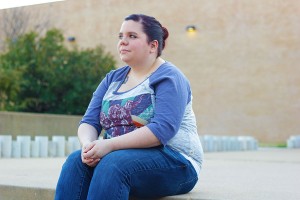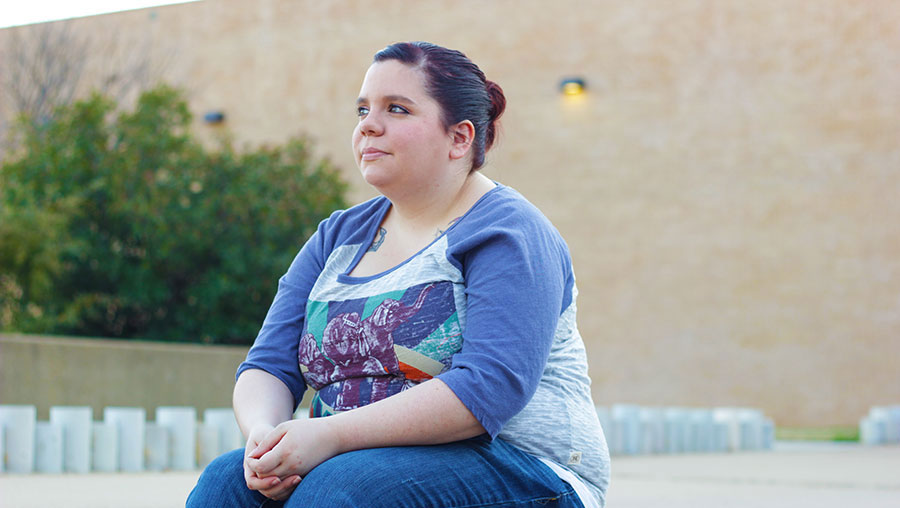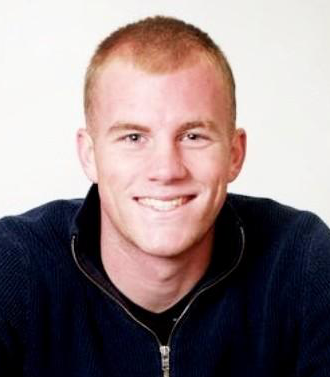By Karen Gavis/editor-in-chief

Zach Estrada/The Collegian
It was not until she watched a cartoon about sexual assault and abuse with her third-grade class that the 8-year-old realized what had been happening to her since age 4 was wrong.
“I was like, wait, that’s happened to me,” NW marketing major Lindsey Eagan said. “If I hadn’t seen the video, who knows how long it might have happened?”
After watching the video, Eagan said she told one of her classmates what was happening. He said he thought she should tell someone.
Eagan told her babysitter.
“I didn’t know it was wrong,” she said. “It just didn’t feel right. No one ever talks about it to a 4-year-old.”
Eagan said her abuser was a family member, and although her parents believed her, other family members did not. Since she had not worded her experiences to the police in a manner that warranted an arrest, the man was not immediately charged.
“I didn’t tell them [the police] the right way, so they didn’t press charges when I was 8,” she said.
Later, Eagan learned from a counselor that, as a victim of childhood sexual abuse, she had 20 years after her 18th birthday to press charges.
And she did.
Eagan shared her story during a speech while in NE speech assistant professor Lisa Benedetti’s class.
Afterward, “it was really quiet,” Eagan said.
Benedetti said she first met Eagan in her Student Transition to College Success class, and Eagan later enrolled in her speech class.
“She helped me, like, get back on track in school,” Eagan said.
Eagan said Benedetti seemed to really care about her students and encouraged her to keep talking about her experiences.
“I was thrilled to see her on the roster and in my class,” Benedetti said. “She is shy. She is very shy.”
In between those two classes, Eagan’s case had gone to trial. Benedetti said she was shocked after listening to Eagan’s speech because she had kept her speech topic to herself.
“I was proud of her,” she said. “I was emotional to think that she had gone through something like that.”
Benedetti said she noticed a change in Eagan’s confidence level and thinks it empowered her to realize that she was now the person in control.
“She is a different person than she was,” she said. “There was definitely a change from within.”
Eagan said she thinks the topic of sexual assault is a topic that isn’t discussed often enough. She wants to bring more awareness and openness to the subject.
“She has found her voice,” Benedetti said, “a voice that someone tried to take from her as a child, and now she has reclaimed it.”
Eagan also said sexual assault and abuse victims can carry burdens of hate and shame all by themselves.
“I think there is too much that people of rape and sexual assault carry on their own that needs to be shared,” she said. “I just want people to, like, speak out and do what they feel like they need to do and find their freedom.”
By speaking out herself, Eagan helped another victim who was abused by the same man find her voice.
“Apparently, it was happening to her at the same time it was me,” she said.
Although the man went to jail for the crime, the victim had not taken the stand against him in court, Eagan said. Because of her age, she did not have to.
“She was 10,” she said.
When Eagan’s case went to trial, the other victim was by then an adult.
“When I went forward, she was given a chance to talk about it,” she said. “Me and her got to do a victim’s statement, and we each got to take a turn and say what we wanted to on the stand.”
The other woman thanked her afterward, Eagan said.
“She kind of like clung to me,” she said. “I was like her new support system. Everywhere I went, she went.”
Eagan said during the trial her abuser pleaded guilty to a pre-decided 25-year term. And people who had not believed her before began to apologize.
“I didn’t want to go through the whole trial if I didn’t have to,” she said. “So I agreed.”
No longer does she harbor the hate she felt toward him like she had growing up, Eagan said.
“I don’t hate him anymore. It’s not like I wake up every day, and it’s an easy thing to do to forgive him,” she said. “But I don’t want him to do it to anybody else.”
NE counseling director Condoa Parrent said topics such as sexual abuse are sometimes discussed at TCC in mental health seminars.
Victims of these crimes are not always females, Parrent said. And while male victims sometimes become abusers themselves, that is not seen as much with women.
“The way you feel about yourself is going to be the same whether you’re male or female,” she said.
One way sexual abuse may affect students is that they are more withdrawn, Parrent said. Those students may not ask questions in class or do the things that are otherwise known to help students succeed.
“Any emotional stress can and usually does have an effect on them [students] academically,” she said.
Parrent also said young people who are abused sometimes block it out of their memory.
“And if that’s the person that has control of their life, they often won’t report it,” she said.
Parrent said TCC counselors see many abuse victims and are available for anyone who needs to talk. Anything that is said is confidential.
“We’re here to help with the healing process,” she said. “My recommendation is not to keep that inside.”
Benedetti said Eagan wants to share her story and make other victims aware of their rights.
“She wants the opportunity to help other people,” she said. “I look forward to working with her any way I can to develop the message and get it across.”
Eagan said she still gets nervous talking about what happened, and talking about it more does not make her any less scared to talk about it, but it does make her more prepared.
“I don’t know. It is just so personal,” she said. “Even though I want to talk about it, it is still hard for me to talk about.”
Eagan said she never saw herself becoming an advocate and never liked discussing what happened.
But after standing up for herself in court, she wants everyone else to experience the relief she felt.
“It lifted a lot off of me,” she said, “and it was like freedom.”























